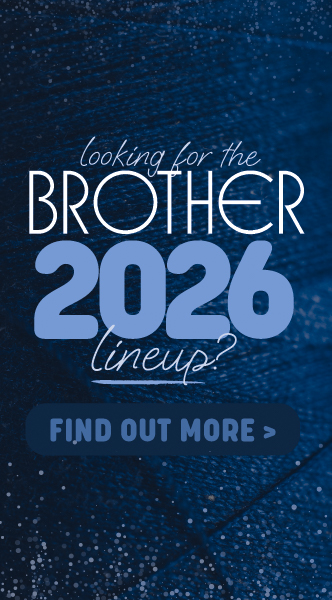Recycled PET Thread Explained
Date Posted:23 December 2021
Sustainability is an important topic that has gained traction in recent years. While it has become more of a priority, most people are yet to take the next step in living a more sustainable lifestyle. Every one of us has the ability to be more eco-friendly, and it's not about sacrificing the things you love or enjoy doing.
Making smarter, healthier and more sustainable choices will have a significant impact on your ecological footprint. There are many ways that you can live a healthier lifestyle that will benefit you and the environment together. For us sewing and embroidery enthusiasts, using recycled PET threads is a great start.
Let's break down the factors of rPET products and why choosing them over alternatives is an important step.
What is PET?
PET is an abbreviation for polyethylene terephthalate. PET is a clear, strong, durable, and recyclable plastic material that is widely used for manufacturing soda bottles, water bottles and food packaging. It is also better known in the textile industry as ‘polyester’.
 Without getting too technical, PET is a polymer substance made from the combination of ethylene glycol and terephthalic acid. Manufacturers take pellets of PET and heat them to create a molten liquid that can be molded into virtually any shape.
Without getting too technical, PET is a polymer substance made from the combination of ethylene glycol and terephthalic acid. Manufacturers take pellets of PET and heat them to create a molten liquid that can be molded into virtually any shape.
PET is the most commonly used thermoplastic in the world and is the preferred material for most consumer products and textiles. Although it is recyclable, producing and manufacturing PET has a harmful impact on the environment. It generates more toxic emissions than manufacturing glass1. A large portion of it also ends up in landfill where it takes up to 1000 years to break down2, or it reaches our oceans causing harm to marine life.
So what is rPET and its benefits?
rPET stands for recycled polyethylene terephthalate. It is repurposing PET material that already exists and giving it a second life, producing new products like fiber for fabrics, and food & beverage packaging.
Recycled PET reduces the plastic waste that would otherwise end up in landfill and decreases the production of new PET from scratch. This means less extraction of natural resources and less energy needed for that extraction, whilst also reducing toxic air pollution that occurs from PET production. In short, rPET has a lower carbon footprint than virgin PET.
rPET thread explained
The demand for environmentally friendly thread products continues to increase. As a result, Gutermann has developed a variety of recycled threads which are made from 100% recycled PET bottles.
The benefits of this thread comes from their recycled raw material, significantly reducing the harmful effects of toxic emissions, landfill and the use of resources. Existing PET bottles are collected and washed in stages before being shredded into "flakes'' and melted. The microfilaments obtained from the granulate then serve as the foundation for the manufacture of the sewing threads. They are produced using Micro Core technology, which is a unique microfilament-based spinning process. Approximately 1,000m of Sew-all rPET thread is produced from just one PET bottle3. That’s 10 individual spools!

1. PET bottles are collected and washed

2. Bottles are shredded into flakes and melted

3. When the flakes are melted, they turn into granules

4. The microfilaments from the granules form the foundation to manufacture the threads

5. The thread is then spun using Micro Core technology

6. Each reel is also made from polystyrene, so the entire spool of thread is recyclable
Should you buy rPET threads? Where can you source them?
Have you ever stopped to think about how sustainable your wardrobe is? If you’re a sewing enthusiast, what are you doing to create sustainably? It’s easy to look past the impact that the fashion and textile industry has on the environment. It has slowly become more of a conversation topic, but we have the opportunity to make a long term commitment to protecting our future.
When we're looking at whether something is eco-friendly, it is the complete product life cycle that must be considered. We need not only to examine whether something is biodegradable or recyclable, but also understand the significant use of other resources like chemicals and pesticides, the amount of water used, or the impact on wildlife. Understanding sustainability can be overwhelming and to truly make an impact it requires a small contribution from everyone. Together, we can make a difference.
 So what can you do? Repurpose, reuse, repair, restore, recycle. You can contribute by making sustainable and healthy choices, and opting for rPET sewing thread is a great way for any sewing enthusiast to do their part. Gutermann’s Sew-All rPET thread range is not only environmentally friendly, but will provide you with outstanding results.
So what can you do? Repurpose, reuse, repair, restore, recycle. You can contribute by making sustainable and healthy choices, and opting for rPET sewing thread is a great way for any sewing enthusiast to do their part. Gutermann’s Sew-All rPET thread range is not only environmentally friendly, but will provide you with outstanding results.
At Echidna, we stock Gutermann’s fabulous range of Sew-All rPET threads, available online or in-store. They can be used for closing and backstitching seams, fine ornamental and decorative stitches and lingerie buttonholes. Use them with a variety of fabric types, from light to heavy weight clothing and decorative fabrics, to knitwear.
Reduce your carbon footprint by recycling where you can, and adding rPET sewing threads to your craft room is a great start. If we all do our part to live sustainably, we can help save the world.




